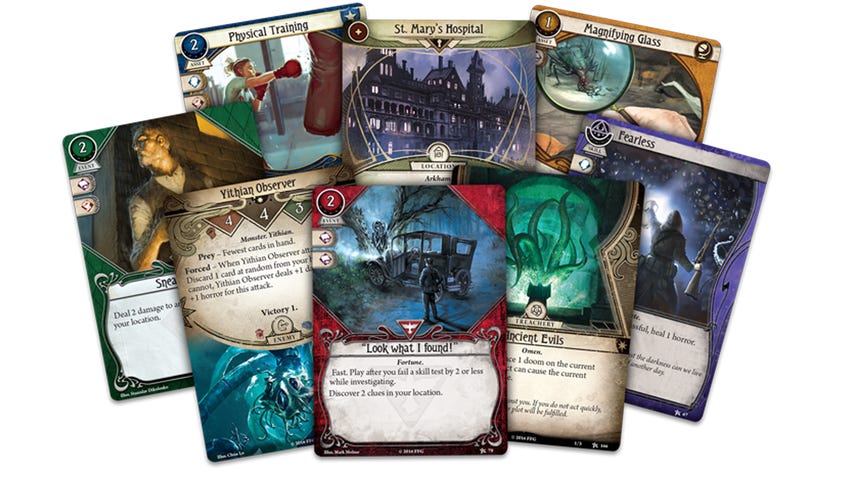Arkham Horror, Marvel Champions and Android: Netrunner studio says it’s still committed to the living card game format
Following cancellations, hiatuses and shifts in release format.
Living card game maker Fantasy Flight Games has reaffirmed its commitment to the format in the wake of cancelled titles, slowing release frequencies and other changes to its output of expandable card games.
The living card game format made its debut in 2008 with A Game of Thrones: The Card Game. A shift away from the randomised booster packs of collectible and trading card games such as Magic: The Gathering and Pokémon, living card games offer fixed expansion packs with identical sets of cards that release on a regular schedule. Fantasy Flight reserved the specific term for its own products, with other card games adopting the format generally known as “expandable card games”.
Since A Game of Thrones - which saw a second edition in 2015 - Fantasy Flight has produced a number of living card games, including its beloved reboot of CCG Netrunner, Android: Netrunner; its co-operative Lord of the Rings and Arkham Horror LCGs; and the recent Marvel Champions, starring the comic-book superheroes of the Avengers and their villains.
However, recent years have seen several of FFG’s living card games come to an end or put on hiatus, with Android: Netrunner cancelled in late 2018 only a matter of months after the release of a revised core set, then-studio head Andrew Navaro announcing in late 2019 that The Lord of the Rings: The Card Game would be put on “a little bit of a break” and A Game of Thrones: TCG’s second edition said to similarly “slow down” as the result of exhausting available content from George RR Martin’s books. The decisions followed Navaro's comments in 2019 that Fantasy Flight had adopted a "more thoughtful" approach to its releases and expansions as a whole, with fewer, more meaningful releases on a slower frequency.

As well as older titles changing frequency or halting new releases altogether, newer living card games have seen the release of products that appear to break away from the periodic, episodic nature of the LCG format. Most prominently, Arkham Horror has seen its individual mythos packs - previously released on a monthly basis - compiled into all-in-one campaign boxes. The game has also seen the launch of a revised core set that supports up to four players, removing the need to pick up multiple copies of the core set to collect the necessary cards for extra players.
“The model is not necessarily about release timing or number of products, but instead about ensuring that when buying into an LCG, players know exactly what they are receiving with their purchase,” Fantasy Flight Games’ product strategy director Jim Cartwright told Dicebreaker when asked if the change signalled shift in the studio’s approach to the LCG format. “In the 13 years that the LCG format has existed, we have learned a lot about what works and what does not.
“In the new Arkham Horror: The Card Game format, we can ensure that players are getting the full story or player experience all at once in the same way that anyone buying into the Marvel Champions: The Card Game gets a complete experience with a new Hero Pack or Campaign Expansion. This means players can make the decision on the type of content they want to add to their game. Regardless of whether a player wants more scenarios or more player content, there is a product that is right for them. We really want to give our players the options to enhance their experience in a way that is most meaningful to them.”
Cartwright highlighted Marvel Champions and Arkham Horror: The Card Game as two of Fantasy Flight’s biggest “successes” of the last year, adding that the recent revised core set for the Arkham Horror LCG was an effort to further boost the audience for the “very popular” series with an entry-level offering.
“The success of Arkham Horror: The Card Game and Marvel Champions: The Card Game showcases the strength of the [living card game] model, and we have listened to fans and retailers to make the experience even better,” Cartwright said. “We wanted to remove the barriers that exist in the original format and make these games more accessible for players and easier for retailers to manage inventory.
“All of that to say that the LCG format continues to be important to FFG and it will continue to evolve as we explore how to make it the best product type it can be.”


